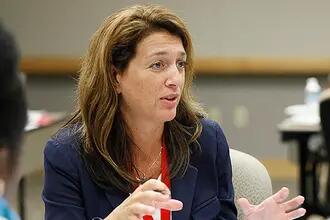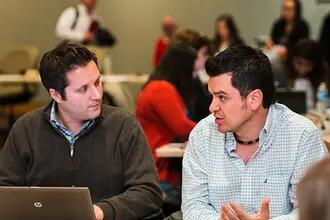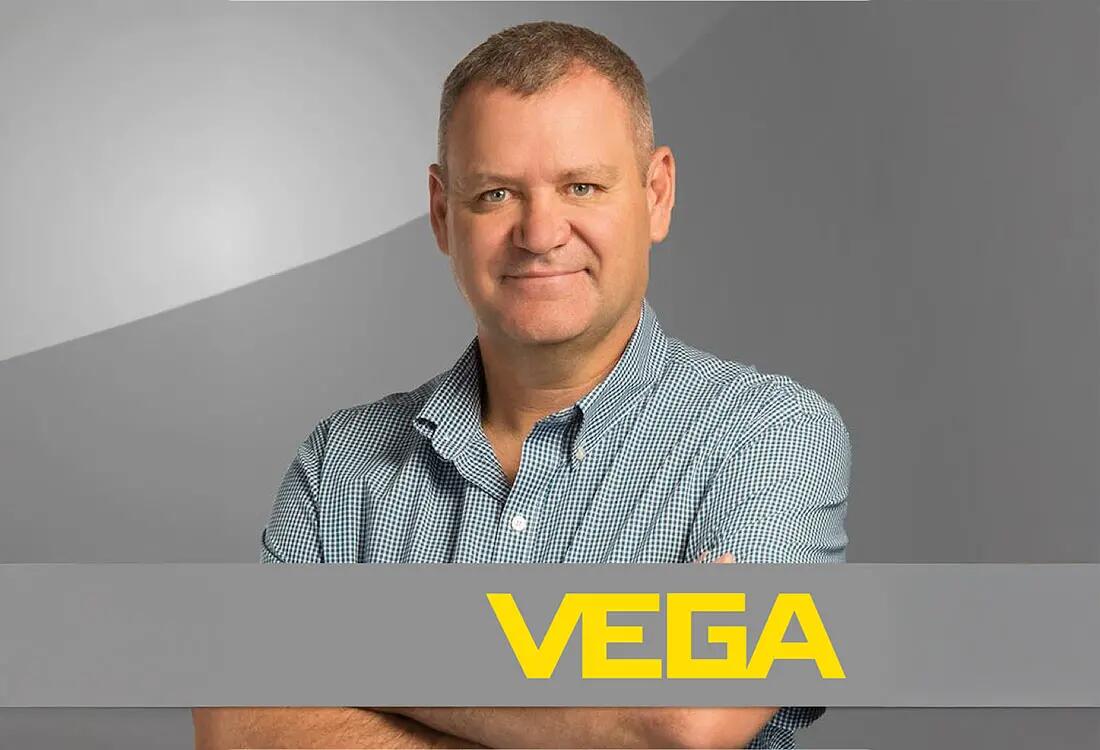
Interested in semi-customized training options for your team or organization?



Rutgers Business School Executive Education is proud to spotlight John Groom as a shining example of forward-thinking and authentic leadership that is truly inspiring.
John Groom serves as the President and CEO of VEGA Americas, a global leader in level and pressure measurement technology. His leadership also extends to Grieshaber Precision America, headquartered in Cincinnati, Ohio. Originally from South Africa, John has devoted over 25 years to VEGA, a tenure marked by unwavering commitment to his team and his organization's mission. Under John's guidance, VEGA Americas has been recognized as one of Cincinnati's "Top Workplaces" for nine consecutive years—an achievement that reflects the strong, people-centered culture he has cultivated.
John is a visionary CEO focused on organizational growth and a champion of personal and professional development. He actively encourages his team to pursue ongoing learning and training and notably participates alongside them, demonstrating a rare and authentic commitment to continuous development. Together, John and several members of the VEGA organization have successfully completed a blend of open enrollment and customized Mini-MBA programs, such as Customer-Centric Management, Team Management Essentials, and Data-Driven Management. These programs were offered in online, virtual live, and onsite/in-person formats to accommodate the distinct needs of VEGA Americas.
John's words of wisdom, shared below in his voice, offer a glimpse into the heart of a leader who measures success not solely by business outcomes but by the depth of his investment in people.
For me, I have an analogy that says, “If I don't know today, I'll try my best to know better by tomorrow.”
I think versatility is something that should be given greater value. We all want to create these specialists, but imagine you created versatile specialists. In my mind, you’ve got to not only look at the training and development of your employees from a product perspective, but it also has to be a balanced perspective to create that versatility within your organization. Once you develop that versatility, you'll be surprised how many leaders you can create that can then move into other areas of the organization because you've equipped them with a whole range of skills.
I am from South Africa, and I began my career in a very small subsidiary. We then grew to a much bigger subsidiary in South Africa, and I was eventually responsible for the continent of Africa, which meant I had to understand the culture not just of South Africans, but also the culture of Nigerians. If you can develop that kind of versatility, you can really create something special within your organization. In my time here with VEGA Americas I've challenged people, but I've given them opportunities to be equipped with the necessary tools and experiences to be greater than they could have imagined.
Lifelong development is within all of us, and as we gather experiences, education, exposure to different moments, people, environments, and countries, you start developing your “alphabet.” Everyone starts at the beginning, and then let's say someone gets all the way to X and maybe they are the CEO at this point. A lot of people believe that they are smart enough and that they should stop learning at X. For me, you look at X and you take that as a point in time, and at that point in time, I'm capable and qualified to be the CEO of a company of $250 million. Then I move to the next letter, which is the Y, and I say that Y is now a company of $350 million. The more people you have that are further and further down the alphabet, the decision-making between the X and the Y becomes very easy because someone in the room will probably have the right answer.
I believe we are creating opportunities to move people further along in their alphabet, and that's why I think our culture is where it is and why we’re speaking a common language within the organization. If you asked some of our employees if they would have imagined doing what they do today two to five years ago, and doing it great at that, I'm not convinced they would tell you yes.
We’ve focused on outcomes-based training. What's the use of training someone if we can't use it tomorrow? I actually have even attended some of the Rutgers courses myself because I want to ensure that the quality of what we present to our employees is really what we want them to have.
What I really appreciate about Rutgers is that they understood the value of a customized training for me. You don't want to sit in 8 or 10 weeks of something and find that only four pieces are relevant and make sense to you. The Rutgers team has been very accommodating in terms of ensuring the content is relevant for our organization, along with our preference for format with some modules delivered in person and others online to meet our needs. Rutgers also doesn’t have a single instructor present eight topics. They bring in a team of professionals to present their specific item or area of expertise. That generates credibility and trust. They listen to the customer, and I think because of that, they’ve got a partner now instead of just a customer. In turn, we have a partner that's working with us and looking to add value to the organization, not just sell me a bunch of stuff.
We’ve had our leadership team and our managers all participate. Each of them has different priorities, problems, or challenges. When they’re all included as an organization, you're making VEGA better.
Through the Capstone projects developed as part of these trainings, we've implemented seven programs. These seven programs are at a different stage in their life within the organization (some are complete, and some are in various stages of execution), which were all outcomes from the work we’ve done through the Rutgers experience.
While we have a great onboarding program for brand new employees, we realized that there was a huge gap in the training for brand new managers when we promote a person who's really great at the job that they have to then be the leader of that department. This realization actually came out of one of the Capstone projects that I spoke about earlier. It was something we had been unaware of that, through the Capstone, created an opportunity for us to be a better [organization] in the future. The great thing is that the employees felt comfortable enough to tell me about it and actually fix it, so we are a better organization tomorrow.
Training is fundamental for the excellence of your company. It also gives you great versatility.
I read something a long time ago that stated, “You shouldn't be afraid of training your people, because imagine you don't train them and they actually stay at your organization.” I train people as if they should be replacing me in the future, and I feel that you should always be training all employees to the next position within your organization.
I want to generate a lot of smart people around me. That’s really where the strength of an organization is going to be. The other big thing is I need tomorrow's leaders, too. I think too many people are afraid of educating the person who's going to replace them. For me this is a great opportunity that you have, to openly educate and empower the people around you to be equipped with the tools necessary to be very successful at your organization, and even better—and a lot of people will disagree with me—to be something higher up at some other organization. If I'm doing my job right, I get the best of the people, yes, but I also give the people an opportunity to be great somewhere else. I think too many people are afraid of that, and they don't invest enough in development of people because of that.
If you can develop trust and openness at the same time, you can course correct and find a better way of doing things, which naturally gives you a more efficient organization; and if you have a more efficient and effective organization, naturally you sell more and do better than most of your competitors out there.
We've made the right decisions, we're investing in what’s best for VEGA, and we have very compelling people in our organization that are hungry to develop, grow, and aspire to be more than they are today. We also have an owner that's committed to our vision. For me, this combination is the reason why we have the success we do today.
I’ve always said, “Never train the people for the job that they have. Train them for the next one.” That would be my advice to any leader out there.
Training can give you information, skills, knowledge and all those things, but the piece that’s not measured enough is the confidence you get out of it because you maybe start believing in your own capability.
Training also shouldn't be something you only do when you're doing well. Can you imagine the negative outcomes from not training people in adverse conditions? I think that's an opportune point in time to create greater versatility. For me, training is a must. It's not a budget or line item.
It’s vital, no matter what job you have, to invest in your training and your development.
Communicating in people's Social Styles is critical. I think that is a special task we have in our organization. Our name badges actually have our Social Styles noted on it, and we've trained our employees that when you walk up to someone and you look at their name badge, there's a certain way you communicate in alignment with the most effective style for the recipient, not for yourself.
Now the second item to note here, which is undervalued, is that you must create a common language within your organization. That is not to mean that we all must speak English. Rather, it is saying that we all have a similar basis to which we're referencing our data or our decision-making, which will generally lead to a consistency in decision-making or actions within your organization. That consistency will result in your customers experiencing greater experiences within your organization and your employees having a much more comfortable environment because everyone is speaking the same language.
We now have exchange programs whereby we send our employees to different subsidiaries: the United Kingdom, China, Germany, the Netherlands, Spain, and South Africa. These are not just great destinations that people get to go to, but the employees are tasked with identifying things that are done in those locations that we would benefit from and bringing those insights back to our organization. We’ve implemented so many good things because we're confident in asking the right questions. We're not afraid to admit when we don't have the best answer or when we can learn from each other and that, I think, leads to a great outcome.
I have a rough diamond analogy that I use, where I believe that everyone, if you’re really committed to putting them under enough pressure and polishing them enough, will actually turn from a stone into a diamond. My greatest reward is in finding those rough diamonds. When I see a VEGA employee achieving more than they could ever imagine and seeing their confidence in themselves because the environment, opportunities, and continued education and learning were provided to them, that is what I find to be the most rewarding in my job. My gas tank gets filled up when observing those moments in my career. Additionally, if I surround myself by good-quality people like these, it makes my job very easy.

